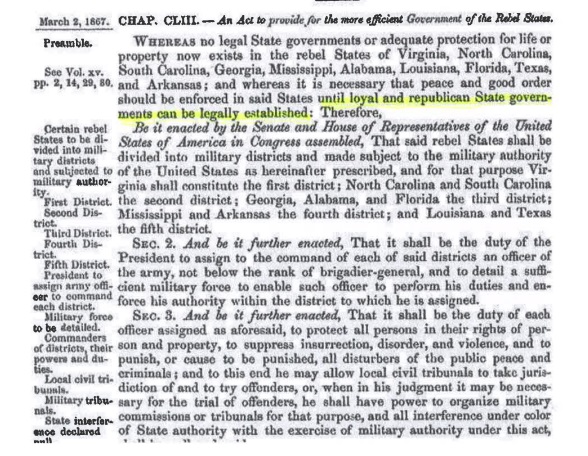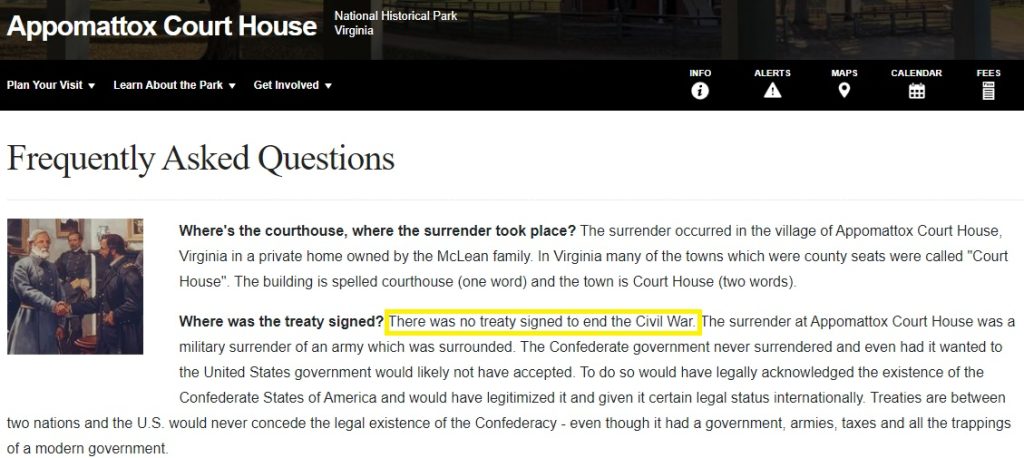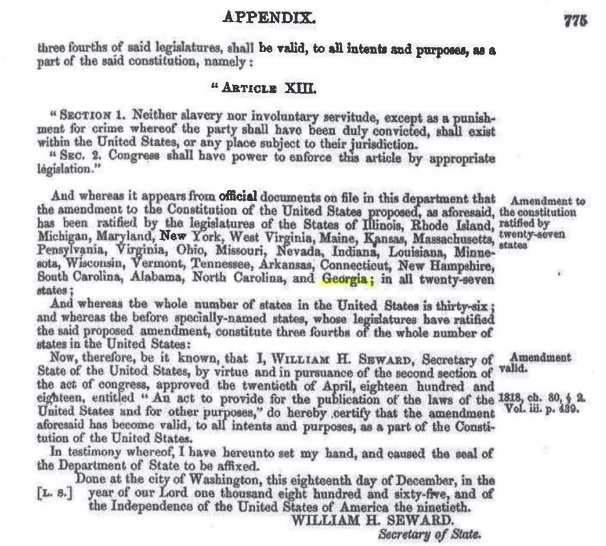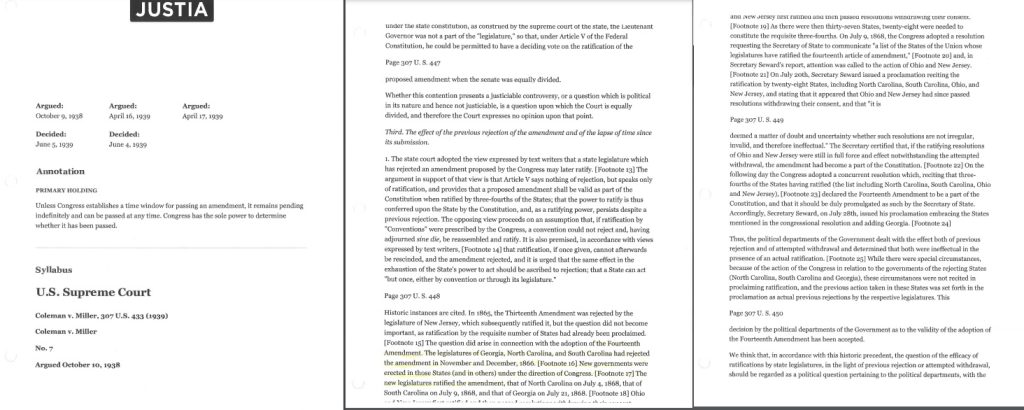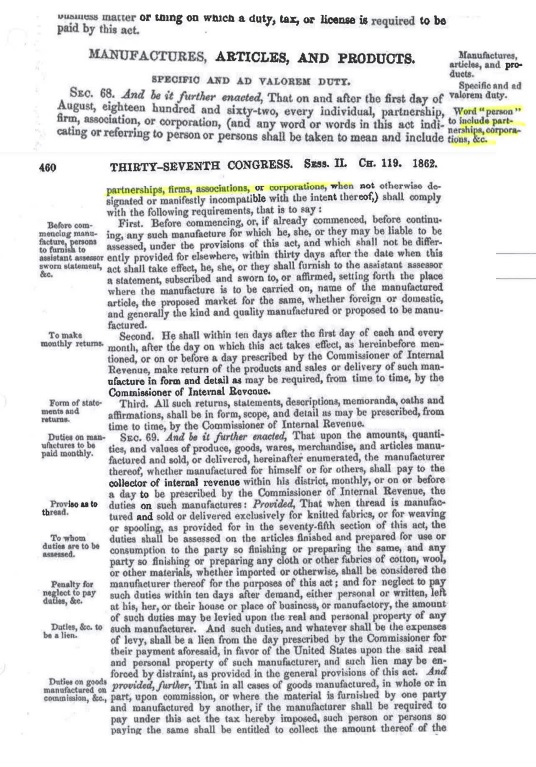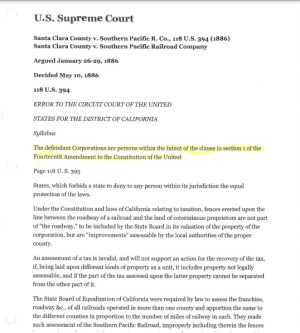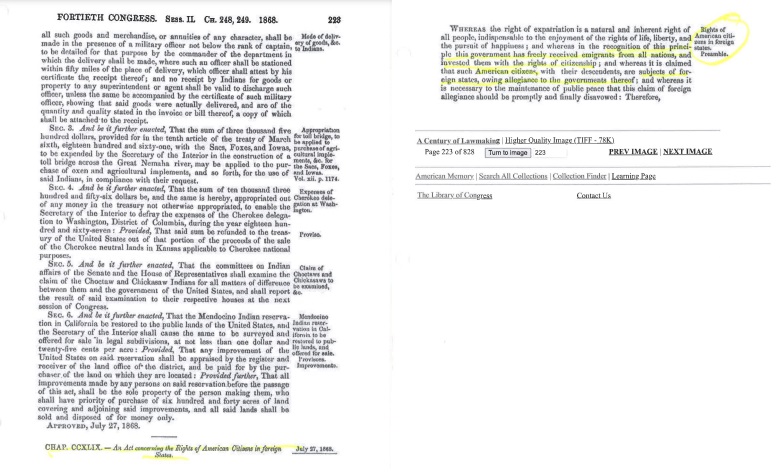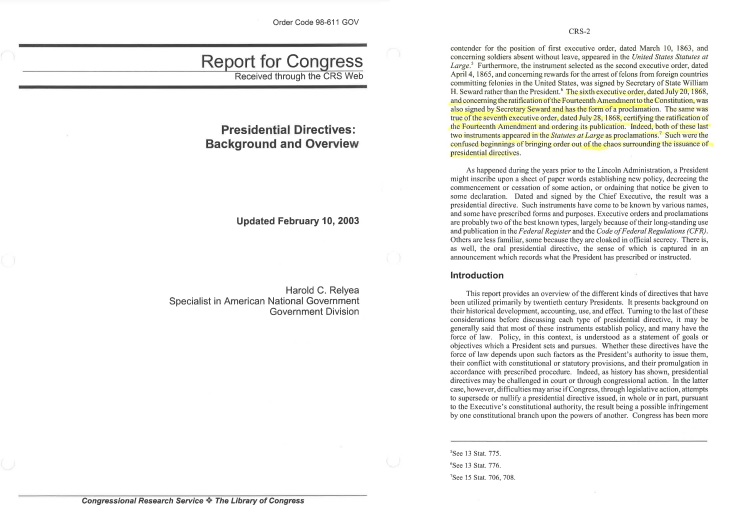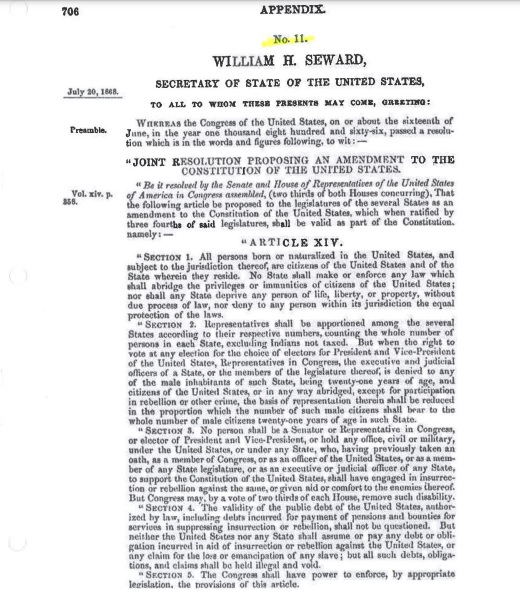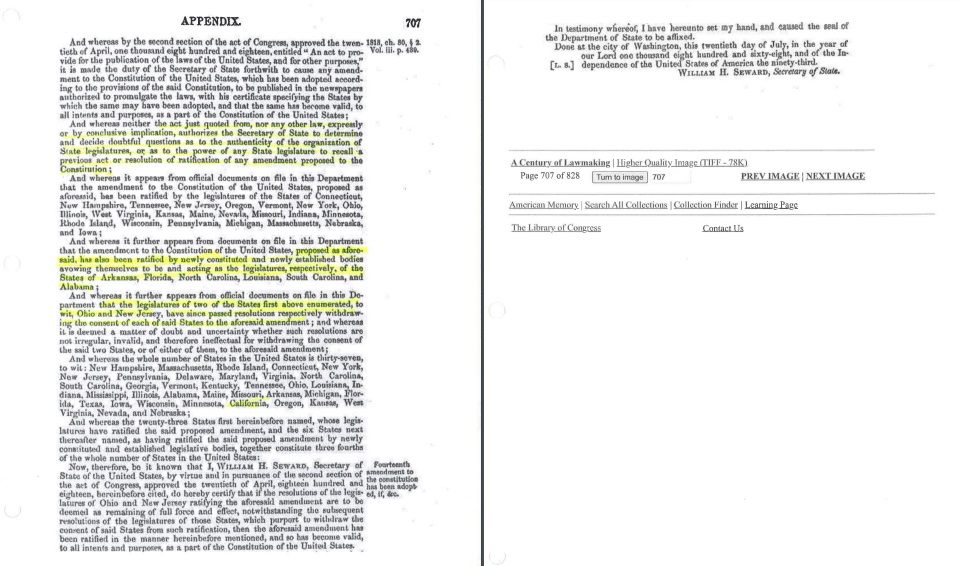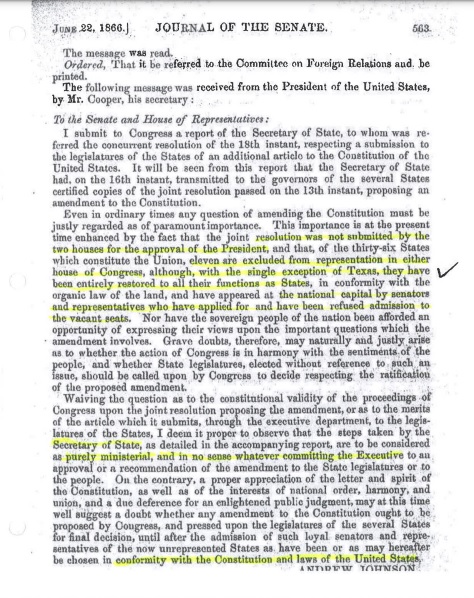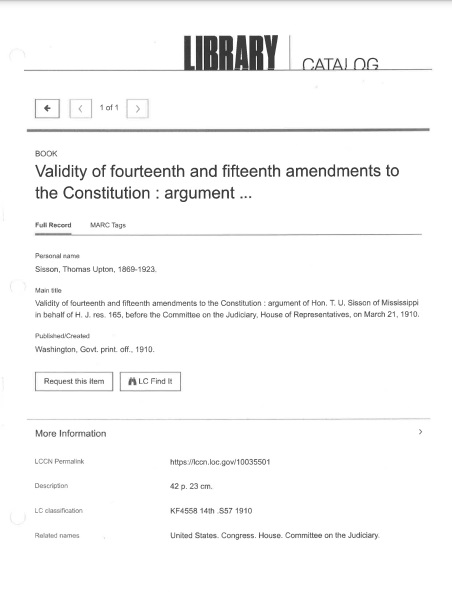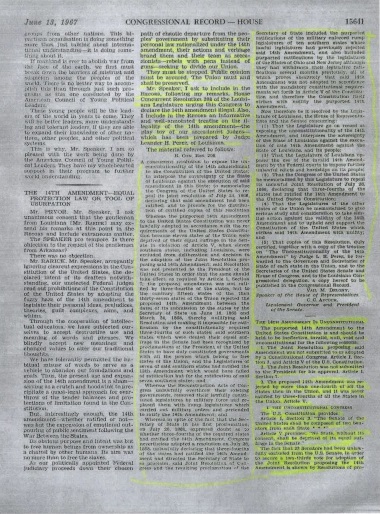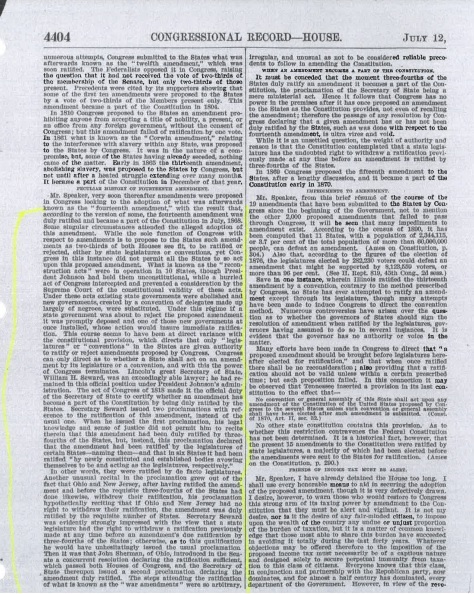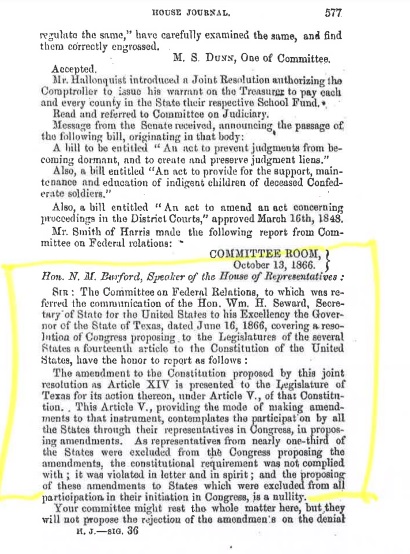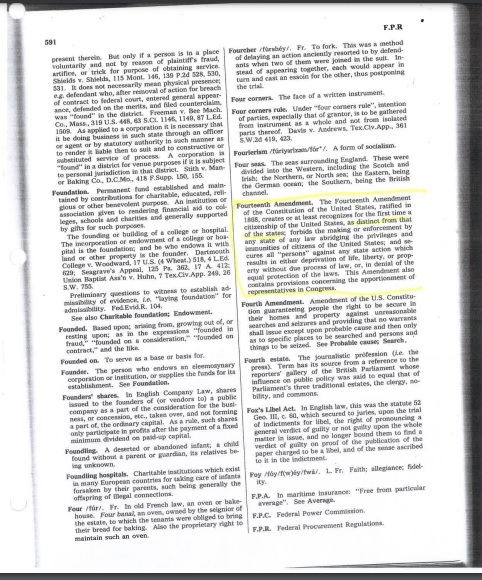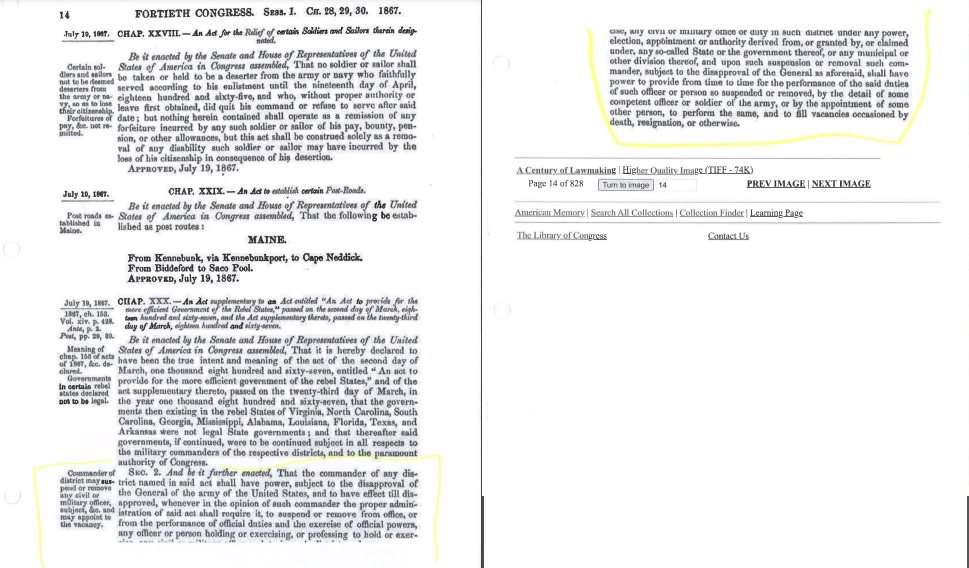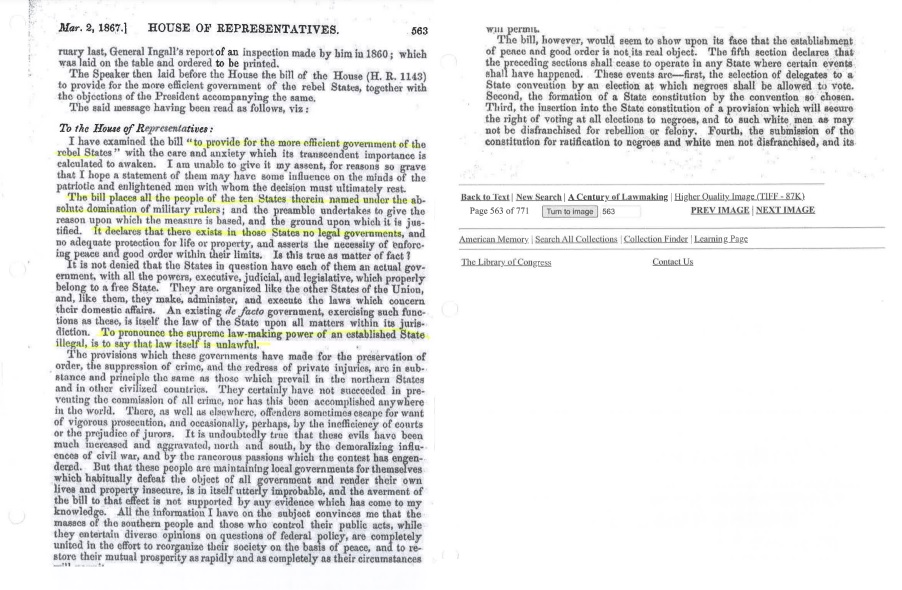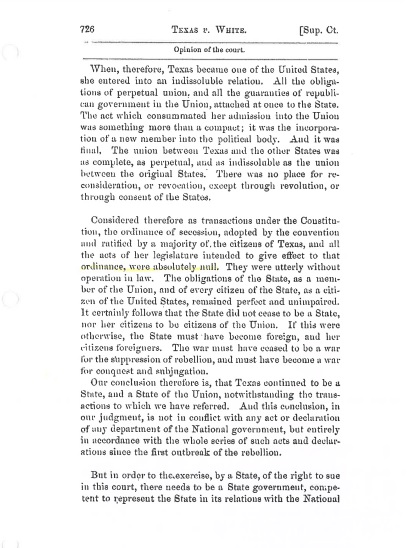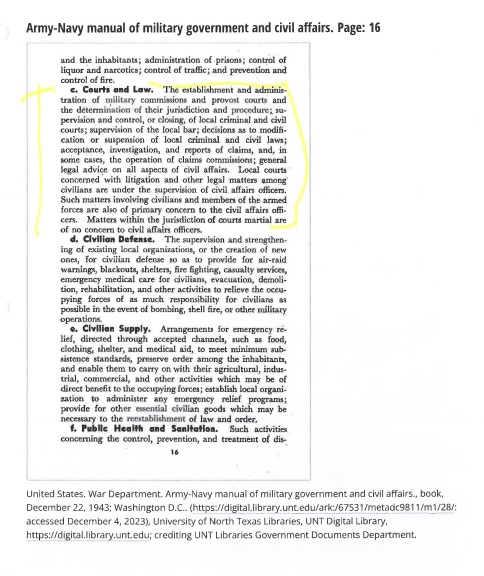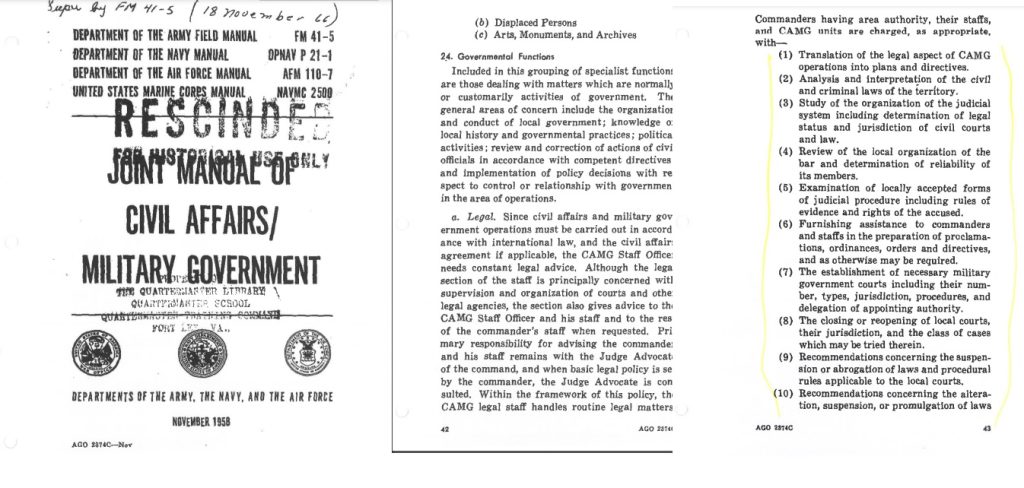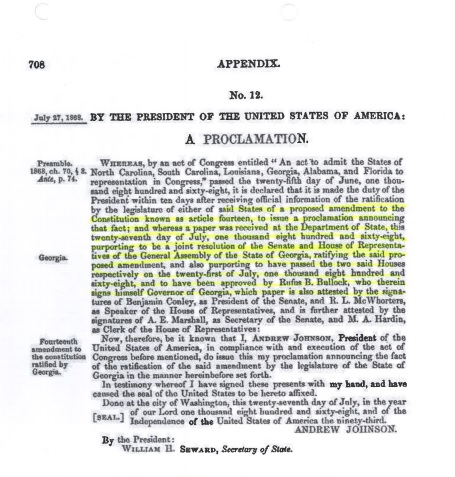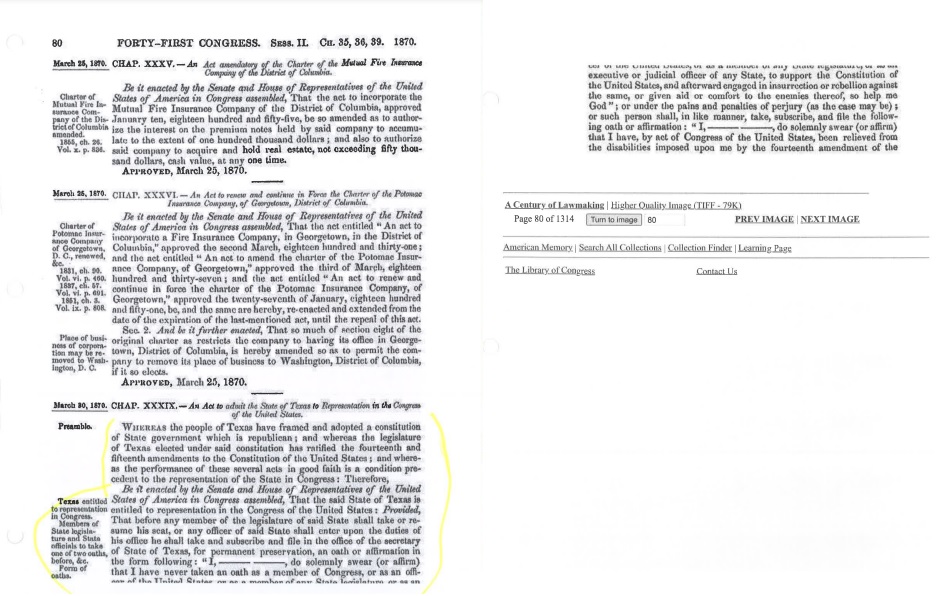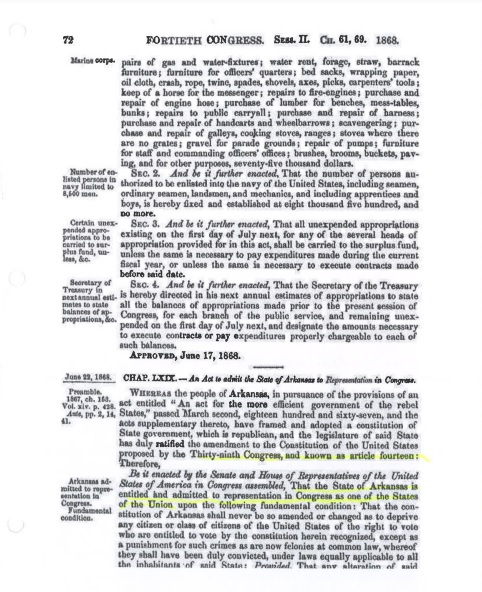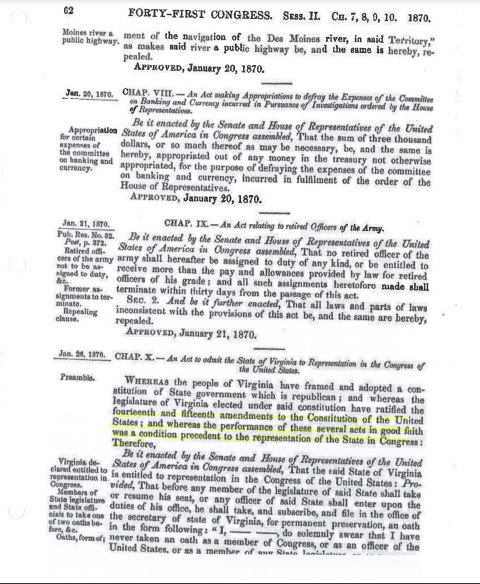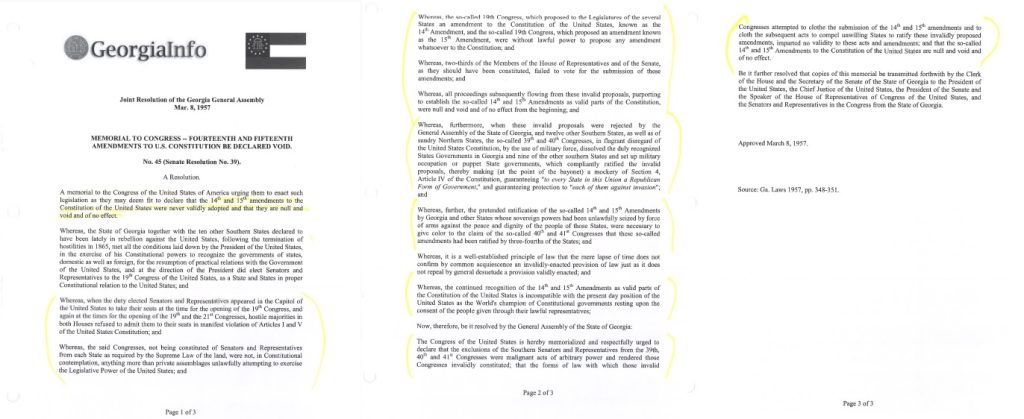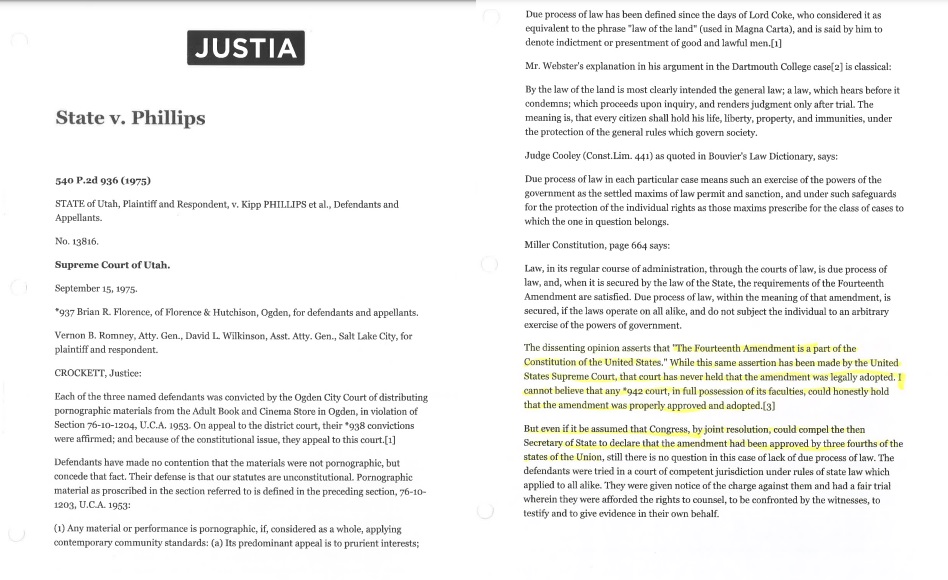
Here’s a question that most people can’t answer, and their attorneys can’t answer. Even top collage teachers can’t answer this question. “Why don’t we have two separate governments in this country ?”
After the civil war they created a punishment government for only those eleven southern states that lost the war. Only ten were named because Tennessee was compliant and passed the 14th amendment. This was a separate different government that they created. Now all 50 states are under that different punishment government rule of law. How and why did this happen? How did the people of California, and all other statehoods that had nothing to do with the civil war, get the same punishment government as those naughty southern states? Let me explain.
To create a different government in 1867, they had to replace the one the founding fathers had established in 1791. It was called “The Reconstruction Acts of the 39th Congress.” (EXHIBIT 1).
https://uscode.house.gov/statviewer.htm?volume=14&page=428#
It was a temporary military government made only for the 11 Rebel States. Tennessee was not named because they were compliant with reconstruction. The last sentence of the first paragraph reads until the loyal Republic state governments can be legally established, showing this was supposed to be a temporary government. I doubt anyone can show me where the reconstruction state governments have ever stepped down or whether reconstruction acts have ever been repealed. So, how did the other 39 States get the same government? Why don’t we have two governments in this country? The answer is general orders 100. (EXHIBIT 2).
https://avalon.law.yale.edu/19th_century/lieber.asp

If you Googled it, you’d see at the top of Google it’s Yale University. You click on it and see it’s the martial law jurisdiction Abraham Lincoln enacted during the so-called Civil War. Article 32 clarifies that a Treaty of Peace must be signed to settle this change’s permanency. Then, Google Treaty a Peace Civil War; at the top of Google, you get nps.gov National parkservices.gov, a branch of the Library of Congress.(EXHIBIT3)
The second paragraph, the first sentence of nps.gov makes clear a treaty of peace was never signed to end the Civil War.
RACIST 14TH AMENDMENT
Now, since the 14th Amendment was falsely ratified in 1868, all laws, courts, and government operate under the jurisdiction of the 14th Amendment. That means for the first 96 years, the 14th amendment was said ratified in 1868 until the Civil Rights Act of 1964. This new “Reconstruction Jurisdiction” “enforced” every law, racist included (different punishment for the same crime but different races ) in the United States. After all, who did the 14th Amendment really make equal in 1868? Not the Native Americans who got slaughtered for decades after its said ratification. Indeed, not women; around half the country’s population was female then. It took the ladies another 50 years after the said ratification of the 14th Amendment and a hard struggle to gain the right to vote and, over 100 years later, equal work for equal pay. Indeed, not the Asian look at the Japanese entertainment camps 70 years after said ratified of the 14th Amendment. Indeed, not the BLACK race. Look at Ms. Parks getting arrested because she was “BLACK” and did not move to the back of the bus 90 years after the 14th Amendment was said ratified. Nowhere does the 14th Amendment say everyone is equal. It took Dr. Martin Luther King JR. and his protest before the U.S. Supreme Court to interpret the “equal protection clause of the 14th Amendment to mean equal rights.
EXPOSING THE BIG LIE, THE 14TH AMENDMENT CREATED A NEW FORM OF SLAVERY; SLAVERY WAS NOT ABOLISHED; IT CHANGED
Fake History is taught just like fake news—the art of making people believe something other than the truth. The 13th Amendment made only a specific type of slavery Unconstitutional: involuntary servitude and slavery. It did not make any other form of slavery unconstitutional. Economic Slavery was born.
The 14th Amendment section 4 created the national public debt, which, in conjunction with income tax and the average American citizen owes on the national debt, made us economic or debt slaves instead. Slavery was not abolished. It was changed.
The 14th Amendment created the national debt in section 4 of the 14th Amendment. One of the two jurisdictions used for gun control is the 14th Amendment, the other interstate commerce clause of the US Constitution. Victimless crimes are made possible through the 14th Amendment jurisdiction. Income tax is once again the 14th Amendment jurisdiction. Just think of how much happier and better off the American people would be without these burdens.
QUESTION OF LAW AND GREAT PUBLIC IMPORTANCE
How did the 13th Amendment get lawfully passed when had it not been for 8 of the 11 Southern States voting to Abolish Slavery and passing the 13th Amendment ratification would have failed? (Exhibit 4) Page 775, which is page 809 of 904 in the pdf
https://www.govinfo.gov/content/pkg/STATUTE-13/pdf/STATUTE-13.pdf (Updated link )
It passed by one vote, and Georgia was the deciding state.
If the Southern States didn’t have genuine or lawful governments, according to Texas v. White, how did the 13th Amendment get lawfully passed?
If the Southern States did have lawful governments, then the 13th Amendment was lawfully passed, and the 14th Amendment was an unlawful treasonous usurp that did NOT lawfully get passed. The US Supreme Court made clear in Colman v. Miller 307 U.S. 433 (1939) (Exhibit 5)
https://supreme.justia.com/cases/federal/us/307/433/
The Southern States declined to adopt the 14th Amendment (as Unconstitutional) through a military act of Congress known as Reconstruction. NEW Governments were formed, and NEW States were erected in the former Southern States in VIOLATION of Article 4 Section 3 of the US Constitution, which provides that “No State shall be formed within the borders of an existing state without the consent of that State and Congress.” And the NEW Southern States adopted the 14th Amendment. The 39th Congress claimed the Southern States did not have real or lawful Government as the reason for Reconstruction.
SO THE NEXT QUESTION IS
“How can both the 13th and 14th Amendments be lawful?“
The 39th congress said the Southern States did not have real of lawful governments. ( That was the purpose for Reconstruction.)
If they had no real or lawful government the 13th amendment could not pass. It is treason to replace the government.

THE 14TH AMENDMENT CHANGED THE AMERICAN PEOPLE’S STANDING IN LAW FROM CONSTITUTIONAL TO CORPORATE USING DOUBLE-MEANING WORDS AND PERVERTED TERMS.
Once you understand the first sentence of the 14th Amendment and what the double-meaning words really mean, it says it all. The first sentence below 14th Amendment.
All (persons)( born) or naturalized in the (United States) and (subject to) the( jurisdiction) thereof are citizens of the United States and of the (State) wherein they reside.
(PERSON) Congress redefined the meaning of the word person in 1862 to include the definition partnership firm or corporation. (EXHIBIT 6 )
https://memory.loc.gov/cgi-bin/ampage?collId=llsl&fileName=012%2Fllsl012.db&recNum=490

(Born) Only corporations are born. Humans are birthed from the womb. Emerging from the water like a boat.

(United States) According to 28 USC subsection 3002 part 15a, the definition of United States means a federal corporation.
(Subject to) It means inferior to, obedient to, governed by, affected by, and accountable for.
(Jurisdiction) Means Authority.
Now that you know the meanings of the double-meaning words, read the first sentence of the 14th Amendment again.
All (persons)( born) or naturalized in the (United States) and (subject to) the( jurisdiction) thereof are citizens of the United States and of the (State) wherein they reside.

The Supreme Court made clear in Santa Clara County v. Southern Pacific Railroad Co., 118 U.S. 394 (1886) that a “person” is a “corporation” within the meaning of the equal protection due process provision of the US Constitution’s 14th Amendment”. (Exhibit 7 )
https://supreme.justia.com/cases/federal/us/118/394/
THE 14TH AMENDMENT IS NOW TREASON

The 14th Amendment was never lawfully adopted according to the US Constitution, as I show below. That’s why no one could repeal the 14th Amendment; it was never law. It’s deemed a political choice as a truly free people; we have a right to give up our rights. The night before the 14th Amendment went into effect on July 27th, 1868, Congress passed The Right of Expatriation. (EXHIBIT 8 )
https://uscode.house.gov/statviewer.htm?volume=15&page=223#
https://uscode.house.gov/statviewer.htm?volume=15&page=224#
So the American people could return to the state-citizen the Constitution created in 1791. According to the Congressional Act, this right can’t be impaired, restricted, denied, or even questioned. Once again, making it voluntary. In the past 150 years, the federal, state, and local governments refused to recognize this citizen and a different jurisdiction that is subject to what they call those people sovereigns—now, making the 14th Amendment treason.
A body politic is a citizen of a country, an element required for sovereignty. A corporate body politic is a citizen of a corporate government. The Constitution in 1791 created a body politic of a state citizen in Article 4, section 2. The 14th Amendment created a corporate body political, a citizen of the United States Corporation. And since the 15th Amendment gave the 14th Amendment Citizens the right to vote. The organic citizens the Constitution created, have not voted or held public office in over a century.
CONSTITUTIONAL JURISDICTIONAL CHALLENGE/QUESTION

How can a court or hearing officer take an oath to support the Constitution, then use a jurisdiction known as the 14th Amendment? When no lawyer or law firm can successfully defend Article 1 Sec. 3, 7 and Article 4 Sec. 3, Article 5, and Article 6 of the U.S. Constitution and at the same moment contend that the 14th Amendment was legally passed. If he or she does so contend, they must repeal the provisions of Article 1 section 3 U.S. Constitution a “Constitutional Congress,” Section 7 “submitted to the President for his approval “Article 4 Sec. 3 ” No state shall be formed” and Article 5 about the ratification of Amendments to the Federal Constitution” ” and ” equal suffrage in Senate” and the Supremacy Clause Article 6 paragraph 2 “Supreme Law of the Land” to say the said 14th Amendment is LAWFUL under his/her OATH to support the Federal Constitution.
EVIDENTIARY SUPPORT
Dyett v. Turner 439 P2d 266 @ 267, 20 U2d 403 (1968) The Supreme Court for the State of Utah exposes the 14th Amendment as a fraud.
Regarding the Fourteenth Amendment, which the present Supreme Court of the United States has by decision chosen as the basis for invading the rights and prerogatives of the sovereign states, it is appropriate to look at the means and methods by which that amendment was foisted upon the Nation in times of emotional stress. We have no desire at this time to have the Fourteenth Amendment declared unconstitutional. In fact, we are not asked to do that. We merely want to show what type of horse that Court has to ride to justify its usurpation of the prerogatives of the states.
Joint Resolution No. 48 proposing the Fourteenth Amendment was a matter of great concern to Congress and the people of the Nation. In order to have this proposed amendment submitted to the 36 states for ratification, it was necessary that two-thirds of each house concur. A count of noses showed that only 33 senators were favorable to the measure, and 33 was a far cry from two-thirds of 72 and lacked one of being two-thirds of the 50 seated senators.
While it requires only a majority of votes to refuse a seat to a senator, it requires a two-thirds majority to unseat a member once he is seated. (Article 1, Section 5, Constitution of the United States) One John P. Stockton was seated on December 5, 1865, as one of the senators from New Jersey. He was outspoken in his opposition to Joint Resolution No. 48 proposing the Fourteenth Amendment. The leadership in the Senate, not having control of two-thirds of the seated senators, voted to refuse to seat Mr. Stockton upon the ground that he had received only a plurality and not a majority of the votes of the New Jersey legislature. It was the law of New Jersey and several other states that a plurality vote was sufficient for election. Besides, the Senator had already been seated. Nevertheless, his seat was refused, and the 33 favorable votes thus became the required two-thirds of the 49 members of the Senate.
In the House of Representatives, it would require 122 votes to be two-thirds of the 182 members seated. Only 120 voted for the proposed amendment, but because there were 30 abstentions, it was declared to have been passed by a two-thirds vote of the House.
Nebraska had been admitted to the Union, and so the Secretary of State, in transmitting the proposed amendment, announced that ratification by 28 states would be needed before the amendment would become part of the Constitution since there were, at the time, 37 states in the Union. A rejection by ten states would thus defeat the proposal.
By March 17, 1867, the proposed amendment had been ratified by 17 states and rejected by 10, with California voting to take no action thereon, which was equivalent to rejection. Thus the proposal was defeated.
One of the ratifying states, Oregon, had ratified by a membership wherein two legislators were subsequently held not to be duly elected, and after the contest, the duly elected members of the legislature of Oregon rejected the proposed amendment. However, this rejection came after the amendment was declared passed.
Despite the fact that the southern states had been functioning peacefully for two years and had been counted to secure ratification of the Thirteenth Amendment, Congress passed the Reconstruction Act, which provided for the military occupation of 10 of the 11 southern states. It excluded Tennessee from military occupation, and one must suspect it was because Tennessee had ratified the Fourteenth Amendment on July 7, 1866. The Act further disfranchised practically all white voters and provided that no senator or congressman from the occupied states could be seated in Congress until a new constitution was adopted by each state, which would be approved by Congress, and further provided that each of the ten states must ratify the proposed Fourteenth Amendment, and the Fourteenth Amendment must become a part of the Constitution of the United States before the military occupancy would cease and the states be allowed to have seats in Congress.
By the time the Reconstruction Act had been declared to be the law, three more states had ratified the proposed Fourteenth Amendment, and two, Louisiana and Delaware, had rejected it. Then, Maryland withdrew its prior ratification and rejected the proposed Fourteenth Amendment. Ohio followed suit and withdrew its prior ratification, as also did New Jersey. California, which earlier had voted not to pass upon the proposal, now voted to reject the amendment. Thus, 16 of the 37 states had rejected the proposed amendment.
By spurious, non-representative governments seven of the southern states which had theretofore rejected the proposed amendment under the duress of military occupation and of being denied representation in Congress did attempt to ratify the proposed Fourteenth Amendment. On July 20, 1868, the Secretary of State issued his proclamation wherein he stated that it was his duty under the law to cause amendments to be published and certified as a part of the Constitution when he received official notice that they had been adopted pursuant to the Constitution. Thereafter, his certificate contained the following language: ( Exhibit 9 )
https://law.justia.com/cases/utah/supreme-court/1968/11089-0.html
The 14th Amendment was not properly ratified. Congress knows this. Every member of Congress received a copy of the Congressional Research Service Report in 2000 and an updated version every year until 2012. Order Code 98-611 GOV prepared for members and committees of Congress. Page 5 of this report, which is CRS-2, top paragraph, makes clear that FAKE Executive Order 6 did not have the signature of the President, only the Secretary of State. So, it’s not even a real Executive Order. Ordered the 14th Amendment ratified. (NOTE: the US State Department first put a different incorrect report after the fact in the pdf online under this order code until I called and pointed it out. So they took it off their website altogether.)(But here it is on a dot Edu website. ) (EXHIBIT 10 )
https://digital.library.unt.edu/ark:/67531/metacrs5247/m2/1/high_res_d/98-611gov_2003Feb10.pdf
(Booked as Fake Presidential Proclamation # 11 at 15 Statue at Large page 706) (EXHIBIT 11 )
https://www.govinfo.gov/content/pkg/STATUTE-15/pdf/STATUTE-15-Pg706.pdf (Updated link )
In the second paragraph of Appendix 15, Stat. @707(EXHIBIT 12 )
https://www.govinfo.gov/content/pkg/STATUTE-15/pdf/STATUTE-15-Pg706.pdf (Updated link)
of Presidential Proclamation 11, the Secretary of State makes clear He’s not legally obligated to determine and decide doubtful questions as to the authenticity of the organization of state legislatures, or as to the power of any state legislature to recall a prevision act or resolution of ratification of any amendment proposed to the Constitution. In the fourth paragraph, the Secretary of State said, “proposed as aforesaid, has also been ratified by newly constituted and newly established bodies avowing themselves to be and acting as the legislatures respectively of the States of Arkansas, Florida, North Carolina, Louisiana, South Carolina, and Alabama.” In the fifth paragraph, the Secretary of State points out that Ohio and New Jersey have since past resolutions respectfully withdrawing their consent for the ratification of the 14th Amendment. In the sixth paragraph, the Secretary of points out it names California as ratifying the 14th Amendment with a declined it also names Ohio and New Jersey, who withdrew their consent for the 14th Amendment. Remember that the 14th Amendment was said to pass by only ONE vote.
NOTE: This question of law has yet to be decided (UNTIL NOW??).
President Andrew Johnson pointed out. The joint resolution proposed the 14th Amendment was not submitted by the two houses for the approval of the President, in violation of Article 1 sec. 7, Secretary of State, as detailed in the accompanying report, is to be considered purely ministerial, and in no sense, whatever commits the Executive to an approval or a recommendation of the amendment to the state legislatures or the people.
(EXHIBIT 13 ) President Johnson pointed out that Congress needed to investigate the Secretary’s proclamation ( which Congress did in 1910. See the paragraph below ). President Johnson points out the 14th Amendment was not adopted in conformity with the Constitution and laws of The United States.
Here is where the president spoke of this-
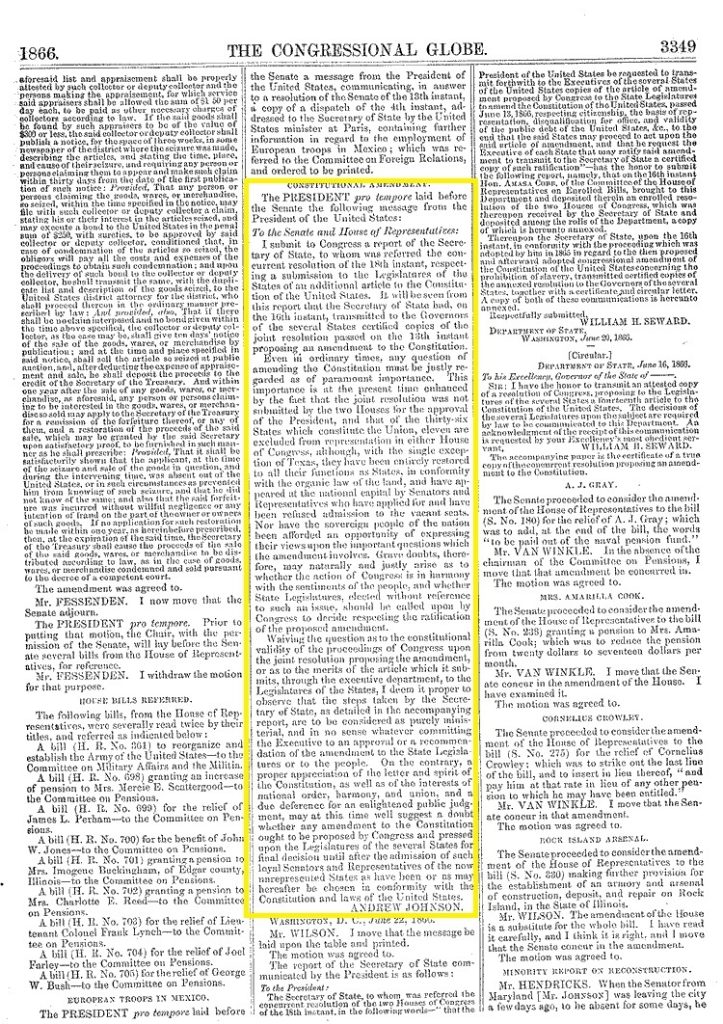
Here is the original document –
March 21, 1910, 61st Congress 2nd Session. The validity of Fourteenth and Fifteenth Amendments to the Constitution: Argument of Hon. T. U. Sisson of Mississippi United States House of Representatives on behalf of H. J. res. 165, before the Committee on the Judiciary, on March 21, 1910, found evidence the 14th and 15th Amendments were not adopted in accordance with the United States Constitution. Findings Let the Attorney-General be required to furnish in available form the certified copies of the original evidence of the passage of the resolutions and the ratifications by the States, and the test can be made easy in any cases that may arise. It will simply place in easy reach of the litigant or afford the Attorney-General, if he desires, the means to make tile test.
(EXHIBIT 14 ) This link
This will take you to the Library of Congress, where you can request this document.
I have added the document under EXHIBIT 14. ( PDF FILE )
113 Cong. Rec. Volume 113, Part 12 (June 13, 1967)
THE 14TH AMENDMENT – EQUAL PROTECTION LAW OR TOOL OF USURPATION?

House Concurrent Resolution 208 of the Louisiana Legislature urging this Congress to declare the 14th amendment illegal. Also, include in the RECORD an informative and well-annotated treatise on the illegality of the 14th Amendment – the play toy of our secessionist judges – prepared by Judge Leander H. Perez of Louisiana—the material referred to as follows:
Pages 15641-15646 Congressional Record. Page 15646, in the center of the page, clarifies that judges take an oath to support the Constitution, nullifying the 14th Amendment. (Exhibit 15 )
https://www.govinfo.gov/content/pkg/GPO-CRECB-1967-pt12/pdf/GPO-CRECB-1967-pt12-2-1.pdf
Arkansas State Representatives have borne witness to the fact the 14th Amendment was not adopted per the U.S. Constitution but in violation thereof. So, it protested the 14th Amendment as Unconstitutional by resolution Arkansas House Journal Page 285-288 @ 278 on December 17, 1866, saying QUOTE “The Constitution Authorizes that two-thirds of both houses to pass an Amendment.” As 11 States were excluded, THE PROPOSED 14TH AMENDMENT WAS NEVER RATIFIED BY THREE-FOURTHS OF THE STATES.
Predetermining the ineffectiveness of said resolution, as above, fifteen (15) States out of thirty-seven (37) States of the Union rejected the proposed 14th Amendment between the date of its submission to the States by the Secretary of State on June 16, 1866, and March 24, 1868, thereby further nullifying said resolution and making it impossible for its ratification by the constitutionally required three-fourths of such States, as shown by the rejections thereof by the Legislatures of the following states:
Arkansas Senate Journal December 15th, 1866, pages 212-216 @215. Congress denied states like Arkansas representation in voting on the 14th Amendment in violation of Article 5 of the U.S. Constitution.
Texas rejected the 14th Amendment on October 27, 1866. (House Journal 1866, pp. 578-584; Senate Journal 1866, p. 471)
Georgia rejected the 14th Amendment on November 9, 1866. (House Journal 1866, p. 68; Senate Journal 1866, p. 72.)
Florida rejected the 14th Amendment on December 6, 1866. (House Journal 1866, p. 76; Senate Journal 1866, p. 8)
Alabama rejected the 14th Amendment on December 7, 1866. (House Journal 1866, pp. 210-213; Senate Journal 1866, p. 183)
North Carolina rejected the 14th Amendment on December 14, 1866. (House Journal 1866-1867, p. 183; Senate Journal 1866-1867, p. 138
South Carolina rejected the 14th Amendment on December 20, 1866. (McPherson, Reconstruction, p. 194; Annual Encyclopedia, p. 452)
Kentucky rejected the 14th Amendment on January 8, 1867. (House Journal 1867, p. 60; Senate Journal 1867, p. 62)
Virginia rejected the 14th Amendment on January 9, 1867. (House Journal 1866-1867, p. 108; Senate Journal 1866-1867, p. 101)
Louisiana rejected the 14th Amendment on February 6, 1867. (McPherson, Reconstruction, p. 194; Annual Encyclopedia, p. 452)
Delaware rejected the 14th Amendment on February 7, 1867 (House Journal 1867, p. 223; Senate Journal 1867, p. 176)
Maryland rejected the 14th Amendment on March 23, 1867 (House Journal 1867, p. 1141; Senate Journal 1867, p. 808)
Mississippi rejected the 14th Amendment on January 31, 1867. (McPherson, Reconstruction, p. 194)
Ohio rejected the 14th Amendment on January 15, 1868 (House Journal 1868, pp. 44-50; Senate Journal 1868, pp. 33-38.)
New Jersey rejected the 14th Amendment on March 24, 1868. (Minutes of the Assembly 1868, p. 743; Senate Journal 1868, p. 356)
UNCONSTITUTIONAL STATE CONSTITUTIONAL CONVENTIONS UNDER RECONSTRUCTION
POINT 5. The several “State Constitutional Conventions” that were organized under the “Military Districts ” of former said “States” Per the “Reconstruction Act” of March 2, 1867, did not conform to the provisions of the United States Constitution. As evidenced by 15 Stat. 731 Ch. 70, the vote taken to hold a “Constitutional Convention” within the several southern States was adopted by a large majority. The “Statute” did not reveal that the majority votes of those States were of the “COLORED RACE” of the population. This fact is confirmed within May 13, 1868, Senate Executive Document No. 53 of the 40th Congress, 2d Session, issued in compliance with the “Resolution” of the Senate of December 5, 1867, by the General of the Army, Ulysses S. Grant. This “Document” consists of 12 pages, and it may be found in the” CIS Serial Index” of 1867 as “S. ex. doc. 53 (40-2) 1317.”
These “Electors” and the “Members” elected to the several “State Constitutional Conventions” were made up of the “COLORED RACE.” They did not have the “lawful status” of a citizen of a State or a “citizen” of the United States, nor did they have any Political Rights of “Suffrage” under any law of any State for want of an Amendment to the United States Constitution. Any “Acts of Law” coming from those State Conventions or any Legislatures that were convened under the “Reconstruction Acts” of 1867 are unconstitutional and must be declared so by proper authority, pursuant to Article 6, Paragraph 2 of the U.S. Constitution.
Congressional Record Page 4404, 1909 (Exhibit 16 )Makes clear the 14th Amendment was said ratified by de facto legislatures https://www.govinfo.gov/content/pkg/GPO-CRECB-1909-pt4-v44/pdf/GPO-CRECB-1909-pt4-v44-21-1.pdf
While the sole function of Congress with respect to amendments is to propose to the States such amendments as two-thirds of both Houses see fit, ‘to be ratified or rejected, either by state legislatures or conventions, yet Congress in this instance did not permit all the States too so act upon this proposed amendment. What is known as the “Reconstruction Acts” were in operation in 10 States, though President Johnson had held them unconstitutional, while a hurried Act of Congress intercepted and prevented a consideration by the Supreme Court of the constitutional validity of these acts. Under these acts, existing state governments were abolished, and new governments, created by a convention of delegates made up largely of negroes, were substituted. Under this regime, if a state government was about to reject the proposed amendment, it was promptly deposed, and one of those new governments was installed at once, whose action would ensure immediate ratification. This course seems to have been at direct variance with the constitutional provision, which directs that only “legislatures” or “conventions” in the States are given authority to ratify or reject amendments proposed by Congress. Congress can only determine whether a State shall act on an amendment by its legislature or a convention, and with this, the power of Congress terminates. Lincoln’s great Secretary of State, William H. Seward, was an exceedingly able lawyer; he had remained in this official position under President Johnson’s administration. The act of Congress of 1818 made it the official duty of the Secretary of State to certify whether an amendment had become a part of the Constitution by being duly ratified by the States. Secretary Seward issued two proclamations with reference to the ratification of this amendment instead of the usual one. When he issued the first proclamation, his legal knowledge and sense of justice did not permit him to recite therein that this amendment had been duly ratified by three-fourths of the States, but, instead, this proclamation declared that the legislatures of certain States-naming had ratified the amendment them-and that in six States it had been ratified “by newly constituted and established bodies avowing themselves to be and acting as the legislatures, respectively. “In other words, they were ratified by de facto legislatures.”
Texas House Journals 1866 page 577-584
(Exhibit 17 ) The 14th Amendment is Unlawful also see page 581 “Military Government.”

https://lrl.texas.gov/scanned/Housejournals/11/10131866_574.pdf
Page 577, State of Texas: “The amendment to the Constitution proposed by this joint resolution as Article XIV is presented to the Legislature of Texas for its action thereon, under Article V of that Constitution. Article V., providing the mode of making amendments to that instrument, contemplates the participation of all the States through their representatives in Congress in proposing amendments. Representatives from nearly one-third of the states were excluded from Congress’s proposal for the amendment. The Constitutional requirement was not complied with; it was violated in letter and in spirit, and the proposing of these amendments to States that were excluded from all participation. in their initiation in Congress, is a nullity”
SUPREMACY CLAUSE OF THE U.S. CONSTITUTION
To create a different “citizen,” “subject to” a different “jurisdiction,” “a national Debt,” “take away guaranteed State Rights,” “Change the way the Senate is Chosen,” and a “different” form of government. And replaced it with the one the Constitution originally created using several Unconstitutional Acts. POINTS 1- 15 below demonstrate outright TREASON and MISPRISION of TREASON for duty-bound officials to do nothing when made aware.
The strongest argument against the validity of the 14th Amendment is it violates the “Supremacy Clause” of the U.S. Constitution Article 6 Paragraph 2, which states: “This Constitution, and the laws of the United States which shall be made in pursuance thereof; and all treaties made, or which shall be made, under the authority of the United States, shall be the supreme law of the land; and the judges in every State shall be bound thereby, anything in the CONSTITUTION or laws of any State to the contrary notwithstanding”…
In the original Article 4 Section 2, the state-citizen was not a corporation.
FOURTEENTH AMENDMENT Black’s Law Dictionary 5th Ed. Page 591 (in part). It became part of the Organic Law on July 28, 1868. It created or at least recognized for the first time a citizen of the United States as distinct from that of the State(ARTICLE 4 SEC.2 US CONSTITUTION ORIGINAL STATE CITIZEN). (EXHIBIT 18 )
THE UNCONSTITUTIONAL STATE LEGISLATURES THAT ADOPTED THE 14TH AMENDMENT
The following paragraph, which appears in Section 2 of the Reconstruction Act of July 19, 1867 (15 Stat. 14, Ch. 30),(Exhibit 19 ) provides us with more Constitutional questions:(Exhibit 19 )
“That the commander of any district named in said act (14 Stat. 428, Ch. 158) shall have power,
and … to suspend or remove from office, or from the performance of official duties and the exercise of official powers, any officer or person holding or exercising, or professing to hold or exercise, any civil … office or duty in such district under any power, election, appointment or authority derived from, or granted by, or claimed under any so-called State or the government thereof, or any municipal or other division thereof, and upon such suspension or removal such commander. .. shall have the power to provide from time to time for the performance of the said duties of such officer or person so suspended or removed, BY THE DETAIL OF SOME COMPETENT OFFICER OR SOLDIER OF THE ARMY, OR BY THE APPOINTMENT OF SOME OTHER PERSON, to perform the same, and to fill vacancies occasioned by death, resignation, OR OTHERWISE.” [Emphasis added]
Several “State Constitutions” that were adopted under the “Reconstruction Acts” of 1867 provided that the members of the Legislatures of those southern States may/shall consist of “colored people of whatever race,” and if the people of those States refused to elect and seat those “colored people of whatever race” into the Legislatures of their States; the Military Commanders of those Military Districts appointed the members of those Legislatures under the (purported) authority of Section 2 of the Reconstruction Act of July 19, 1867. Whereas the 14th and 15th Amendments to the U.S. Constitution WERE NOT IN EXISTENCE at the time the newly elected/appointed legislators were seated within their respective States, and whereas those Legislators consisted of “Colored People of Whatever Race,” the State Legislatures of the southern States consisted of Members who had no “lawful status” of being “citizens” of any State or of the United States. Any “Acts” (including the “Resolutions” ratifying the 14th Amendment) that were passed by the “newly” created State Legislatures are unconstitutional. Said “Resolutions of Ratification” are without lawful force or effect, for they were adopted outside the authority of the Constitution of the United States.
Several “Governors” of the southern States were removed from the Civil Office by “Military Commanders” under the above-cited Section 2 of the Reconstruction Act of July 19, 1867, and were replaced with “Army Officials” or other military appointees. These Military Commanders or appointees declared that they had the authority to reject or approve “Resolutions” of the Legislatures of their “Military Districts.” They declared that they had the authority to submit “Resolutions of Ratification” to the U.S. Secretary of State, declaring that the Legislatures of their “Military Districts” had ratified the 14th and 15th Amendments to the United States Constitution. [Note: “Military Districts” are not “States” of the Union. “Military Districts” are subject to the exclusive jurisdiction of the U.S. Congress, while a State of the Union is a foreign corporation to the United States that exercises sovereign authority of its own. The two forms of government are different, and they cannot co-exist. The U.S. Congress, in and through its Military Districts, has no authority to ratify Amendments to the U.S. Constitution.].
Several “State Constitutions” that were adopted under the “Reconstruction Acts” of 1867 provided that the members of the Legislatures of those southern States may/shall consist of “colored people of whatever race,” and if the people of those States refused to elect and seat those “colored people of whatever race” into the Legislatures of their States; the Military Commanders of those Military Districts appointed the members of those Legislatures under the (purported) authority of Section 2 of the Reconstruction Act of July 19, 1867. Whereas the 14th and 15th Amendments to the U.S. Constitution WERE NOT IN EXISTENCE at the time the newly elected/appointed Legislators were seated within their respective States, and whereas those Legislators consisted of “Colored People of Whatever Race,” the State Legislatures of the southern States consisted of Members who had no “lawful status” of being “citizens” of any State or of the United States. Any “Acts” (including the “Resolutions” ratifying the 14th Amendment) that were passed by the “newly” created State Legislatures are unconstitutional. Said “Resolutions of Ratification” are without lawful force or effect, for they were adopted outside the authority of the Constitution of the United States. So, the 14th Amendment said ratification is in Violation of Article 1 Sec. 3, 7, Article 5, 6, 9th, and 10th Amendments of the U.S. Constitution, and Article 2 of the Articles of Confederation and Arkansas can’t be a lawful State according to the U.S. Constitution Article 4 Sec. 3.
UNCONSTITUTIONAL U.S. SENATE 14TH AMENDMENT
The United States Constitution provides:
Article 1, Section 3: “The Senate of the United States shall be composed of two Senators from each State ***”
Article 5 provides: “No State, without its consent, shall be deprived of its equal suffrage in the Senate.”
The fact that twenty-three (23) Senators had been unlawfully excluded from the U.S. Senate in order to secure a two-thirds vote for the adoption of the Joint Resolution proposing the 14th Amendment is shown by Resolutions of protest adopted by the following state legislatures as the State House and Senate Journals make clear in point 4 of this motion adopted by reference.
The ten States were organized into Military Districts under the unconstitutional “Reconstruction Acts,” their lawfully constituted Legislatures illegally were removed by “military force,” and they were replaced by rump, o-call Legislatures, seven of which carried out military orders and pretended to ratify the 14th Amendment, as follows:
Arkansas on April 6, 1868 (McPherson, Reconstruction, p. 53).
North Carolina on July 2, 1868 (House Journal 1868, 15; Senate Journal 1868, p. 15).
Florida on June 9, 1868 (House Journal 1868, p. 9; Senate Journal 1868, p. 8).
Louisiana on July 9, 1868 (Senate Journal 1868, p. 1).
South Carolina on July 9, 1868 (House Journal 1868, 50; Senate Journal 1868, p. 12).
Alabama on July 13, 1868 (Senate Journal, 40th Congress, 2nd Session. p. 725).
Georgia on July 21, 1868 (House Journal 1868, p. 50
Furthermore, the States of Louisiana and Arkansas governments had been re-established under a Proclamation issued by President Abraham Lincoln on December 8, 1863. (Vol. I, pp. 288-306; Vol. II, pp. 1429-1448 – “The Federal and State Constitutions,” etc., compiled under Act of Congress on June 30, 1906, Francis Newton Thorpe, Washington Government Printing Office, 906.)
The government of Georgia had been re-established under a Proclamation issued by President Andrew Johnson on June 17, 1865. (Same, Thorpe, Vol. II, pp. 809-822.)
The government of Alabama had been re-established under a Proclamation issued by President Andrew Johnson on June 30, 1865. (Same, Thorpe, Vol. VI, pp. 3269-3281.)
The government of South Carolina had been re-established under a Proclamation issued by President Andrew Johnson dated June 30, 1865. (Same, Thorpe, 1. VI, pp. 3269-3281.)
These three “Reconstruction Acts” (14 Statutes at Large, p. 428, etc.; 15 Statutes at Large, p. 14, etc.) under which the above State Legislatures were illegally removed and unlawful rump or puppet so-called Legislatures were substituted in a mock effort to ratify the 14th Amendment, were unconstitutional, null and void, ab initio and all acts done thereunder were also null and void, including the purported ratification of the 14th Amendment by said six (6) Southern puppet State Legislatures of Arkansas, North Carolina, Louisiana, South Carolina, Alabama, and Georgia.
Those Reconstruction Acts of Congress and all acts and things unlawfully done thereunder violated Article 4, Section 4 of the United States Constitution, which required the United States to guarantee every State in the Union a republican form of government. They violated Article I, Section 3, and Article 5 of the Constitution, which entitled every State in the Union to two Senators because, under provisions of these unlawful acts of Congress, ten (10) States were deprived of having two Senators or equal suffrage in the Senate.
JAMES MADISON’S AND THOMAS JEFFERSON’S KENTUCKY VIRGINIA RESOLUTION OF 1798
The 14th Amendment violates James Madison’s and Thomas Jefferson’s Kentucky Virginia Resolution of 1798 by Unlawfully giving powers to a Federal Government that is only limited by law to the powers outlined in Article 1 Section 8 Clause 1-17 of the U.S. Constitution. Thus violating our framers’ intent of the powers granted to the federal government. The 14th Amendment did all without being ratified adequately according to the U.S. Constitution. This HEARING/COURT took an OATH to Support as the SUPREME law of the land and anything in the Constitution or laws of any State to the contrary notwithstanding.
UNCONSTITUTIONAL U.S. HOUSE SAID ADOPTED THE 14TH AMENDMENT
Ten former southern states after being sworn back into the Union and the President declaring peace Proclamation 153—Declaring the Insurrection in the Certain Southern States to at an End April 2, 1866.
The 39th Congress, without lawful authority, declared ten southern states total, claiming they did not have lawful governments. They reduced ten lawful Southern States into military Districts without lawful quoted authority because they failed to vote on and ratify the 14th Amendment. The new military District State Governments (in violation of Article 4 Section 3 of the U.S. Constitution and The Articles of Confederation Section 2) remained as such until they voted on adopted and ratified the 14th Amendment. NOTE: MILITARY DISTRICTS IN LAW ARE NOT STATE GOVERNMENTS PER U.S. CONSTITUTION. Once again, this shows the 14th Amendment is notwithstanding under the U.S. Constitution.

THE 14TH AMENDMENT FAILED RATIFICATION BY THE STATES’ ORGANIC GOVERNMENTS
THE PRESIDENT OF THE UNITED STATES AND THE UNCONSTITUTIONAL 14TH AMENDMENT
President Andrew Johnson’s March 2, 1867, veto Address in which the President of the United States warned Congress, “If you go ahead with Reconstruction, you will make the law itself unlawful, creating a de-facto government in America.” (Exhibit 20)
https://www.digitalhistory.uh.edu/exhibits/reconstruction/section4/section4_10veto.html
The 14th Amendment is the de facto jurisdiction the president warned Congress about.
CALIFORNIA’S VOTE WAS UNLAWFULLY CHANGED
On March 2nd, California declined to adopt the 14th Amendment 1868 California Journal of the Assembly Page 601. On March 17th, 1868, California Journal of the Assembly Page 758, The California House declined to adopt the 14th Amendment at 15 Stat. 707. The Secretary of State William H. Seward stated Ohio and New Jersey legislatures passed resolutions withdrawing their consent for the said ratification of the 14th Amendment. Ohio and New Jersey were still counted, as the Secretary points out in paragraph 6 15 Stat. 707. But California’s vote was changed without their consent or resolution. The 14th Amendment was only said ratified by ONE vote minus California the 14th Amendment failed anyway.
UNCONSTITUTIONAL STATES VOTING FOR THE 14TH AMENDMENT
The said 14th Amendment was said to have passed by one vote. So, exposing several counted unconstitutional states to clarify a LAWFUL vote count EXCLUDING THE RECONSTRUCTION ACTS will clearly show no lawful Amendment exists pursuant to the U.S. Constitution known as the 14th Amendment.
West Virginia is not a state pursuant to the U.S. Constitution Article 4 Section 3 because they did not have permission from Virginia to form a state in 1863. Since Virginia did not leave the Union and the Constitution of the United States all its law is still in full effect according to the U.S. Supreme Court Texas v. White (1869). Coupled by the additional Constitutional Violations such as Article 1 Section 3, the Senate was not composed of any Senators from the Southern states who never left the Union, and ratification of said state should have lawfully waited for the conflict to end. So, deduct the Unconstitutional counted vote of said State of West Virginia, and the 14th Amendment failed ratification.
Nevada is not a lawful state pursuant to the U.S. Constitution because the Southern States never left the Union, so said vote and ratification should have lawfully waited till the conflict ended so they could lawfully be included pursuant to Article 1 Section 3 of the U.S. Constitution which holds “the Senate shall be composed of two Senators from each State”. So, deduct the unconstitutional counted vote of the State of Nevada and the 14th Amendment failed ratification.
Nebraska is not a lawful State pursuant to the U.S. Constitution because the Southern States never left the Union and had already voted to abolish slavery, and had it not been for 8 of the Southern States voting to abolish slavery, ratification would have failed. It passed by one vote, and Georgia was the deciding vote. So said ratification should have waited till such time as the Southern States could lawfully be a part of the vote pursuant to Article 1 Section 3 of the U.S. Constitution, which holds “the Senate shall be composed of two Senators from each State” and Article 5 of The U.S. Constitution which provides “No State without its consent, SHALL be deprived of its equal suffrage in the Senate.” Without ANY lawful authority whatsoever, the 39 Congress did not include the Southern States in the said ratification process of said State of Nebraska in violation of Article 1 Section 3 and Article 5 of The US Constitution. So, deduct the Unconstitutional counted vote of said State of Nebraska, and the 14th Amendment failed ratification.
The States Arkansas, Florida, North Carolina, Louisiana, South Carolina, and Alabama are not LAWFUL STATES pursuant to the U.S. Constitution Article 4 Section 3, which holds “New states may be admitted by the Congress into this union, but no new states shall be formed or erected within the jurisdiction of any other state; nor any state is formed by the junction of two or more states, or parts of states, without the consent of the legislatures of the States concerned as well as of the Congress. ” Without any Lawful authority, the 39 Congress declared these States not to have lawful Governments for not voting on and passing the 14th Amendment and replaced the said State governments without the consent of said States in violation of Article 4 Section 3 of The U.S. Constitution. No authority is given to Congress to remove lawful State Governments for freely voting their conscience pursuant to their oaths to support their State and Federal Constitutions. This was done after these same states lawfully voted to abolish slavery. Had it not been for 8 of the Southern States voting to abolish slavery, ratification would have failed. It passed by one vote, and Georgia was the deciding vote. So, if these said States did not have lawful Governments for not voting a certain way, would also be saying the 13th Amendment was not ratified with lawful States several months prior? These State Governments were Unlawfully replaced, and their lawful vote declining the 14th Amendment was Unlawfully changed to reflect said ratification violating the U.S. Constitution.
PROCLAMATION OF RATIFICATION OF SAID 14TH AMENDMENT
Regarding the U.S. Constitution, the 14th Amendment, there is no lawful Proclamation of Ratification on record. The U.S. Secretary of State, William H. Seward, had reservations that the U.S. Constitution, 14th Amendment had met the qualifications of ratification (see Proclamation of Ratification dated July 20th, 1868) and he expressly stated that he did not issue the Proclamation of Ratification of his free will. (see Proclamation of Ratification dated July 28th, 1868). U.S. Secretary of State William H. Seward made it clear within the Proclamation of Ratification of July 28th, 1868, that he issued the Proclamation under an “Order” of Congress. (see Concurrent Resolution dated July 21st, 1868). As the U.S. Secretary of State had not issued the Proclamation of Ratification of July 28th, 1868, by his independent judgment under the laws of the United States and as the U.S. Congress had not amended the Act of Congress of April 20th, 1818, to grant the Congress authority to declare the ratification of Constitutional Amendments, there are no lawful publications of Proclamation of Ratification for the U.S. Constitution, 14th Amendment.
The Resolution of Congress ordering the U.S. Secretary of State to issue a Proclamation of Ratification appears also to fail Constitutional legitimacy as it was never submitted to the U.S. President for his approbation as required by Article I, Section 6, Clause 3 of the U.S. Constitution nor does the U.S. Constitution authorize the U.S. Congress to execute the laws of the United States.
All Southern States repealed their State Organic Constitutions when they did an Ordnance of Succession. All 11 Southern States were two or more State Constitutions into the future when the US Supreme Court said in Texas v. White (Exhibit 21 ) that The Ordnance of Succession was null and had no lawful effect whatsoever. Exhibit 21
https://supreme.justia.com/cases/federal/us/74/700/
No one ever returned and correctly repealed the Southern State Constitutions before the Ordnance of Succession. Thus, making all Southern states De Facto???
EXPLAINING MILITARY-SUPERVISED COURTS AND BAR
1943 Army-Navy Manual of military Government and Civil affaire and Military supervised Courts and BAR. (Exhibit 22 ) Page 16 “Courts
https://digital.library.unt.edu/ark:/67531/metadc9811/m1/28/
1958 Army-Navy Manual of military Government and Civil affaire and Military supervised Courts and BAR. (Exhibit 23 ) Page 42-43
North Carolina, Louisiana, Georgia, Alabama, and Florida, to reputation in Congress Sec. (1) “That each of the named states shall be entitled and admitted to representation in Congress “when the legislatures of each state shall have duly ratified the amendment proposed by the 39th Congress known as article 14.(Exhibit 24 ) http://memory.loc.gov/cgi-bin/ampage?collId=llsl HYPERLINK “http://memory.loc.gov/cgi-bin/ampage?collId=llsl&fileName=015/llsl015.db&recNum=741″& HYPERLINK
Here is where “TEXAS” gave up the republic form of government guaranteed by Article 4 Section 4 due to the 14th Amendment. An Act Admitting Texas to Representation in Congress 41st Congress, Session 2, Chap. 39 March 30, 1870. Reads in part as follows. “Whereas the people of Texas have framed and adopted a constitution of the state government which is republican; and whereas the legislature of Texas elected under the said constitution has ratified the 14th and 15th Amendments to the constitution of the United States; and whereas the performance of these acts in good faith is a condition precedent to the representation of the state in Congress. (Exhibit 25 )
http://memory.loc.gov/cgi-bin/ampage?collId=llsl HYPERLINK
An Act to admit the state of Arkansas to Representation in Congress. June 22, 1868, reads in pair section 1,” Whereas the people of Arkansas, in pursuance of the provisions of an Act entitled “An Act for the more efficient government of the rebel states, passed March 2, 1867. The acts supplementary thereto have framed and adopted a constitution of state government, which is Republican. The legislature of said state has duly ratified the amendment to the Constitution of the United States proposed by the 39th Congress, known as Article 14. ( Exhibit 26 )
An Act to admit the State of Virginia to Representation in Congress section reads in Part. “Whereas the people of Virginia have framed and adopted a constitution of state government which is republican; and whereas the Register of Virginia elected under said constitution have ratified the 14th and 15th Amendments to the Constitution of the United States; and whereas the performance of these acts in good faith was a condition precedent to the representation of the state in Congress. (Exhibit 27 )
The 1957 Georgia Memorial to Congress. (Exhibit 28 )
“I cannot believe that any court, in full possession of its faculties, could honestly hold that the [14th] amendment was properly approved and adopted.” (See attached State v. Phillips, 540 P. 2d 936, 941, Supreme Court of Utah, Sept. 15, (1975)). (EXHIBIT 29 )
https://law.justia.com/cases/utah/supreme-court/1975/13816-0.html


